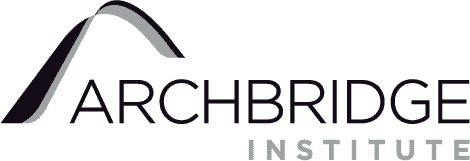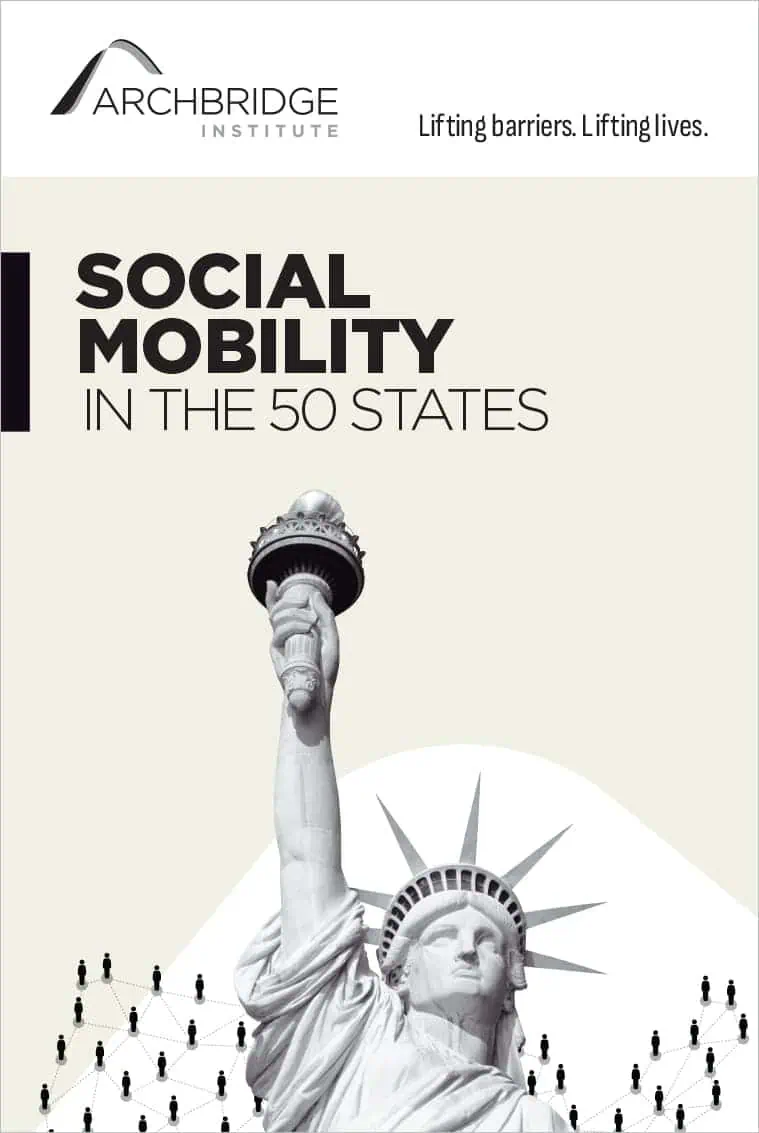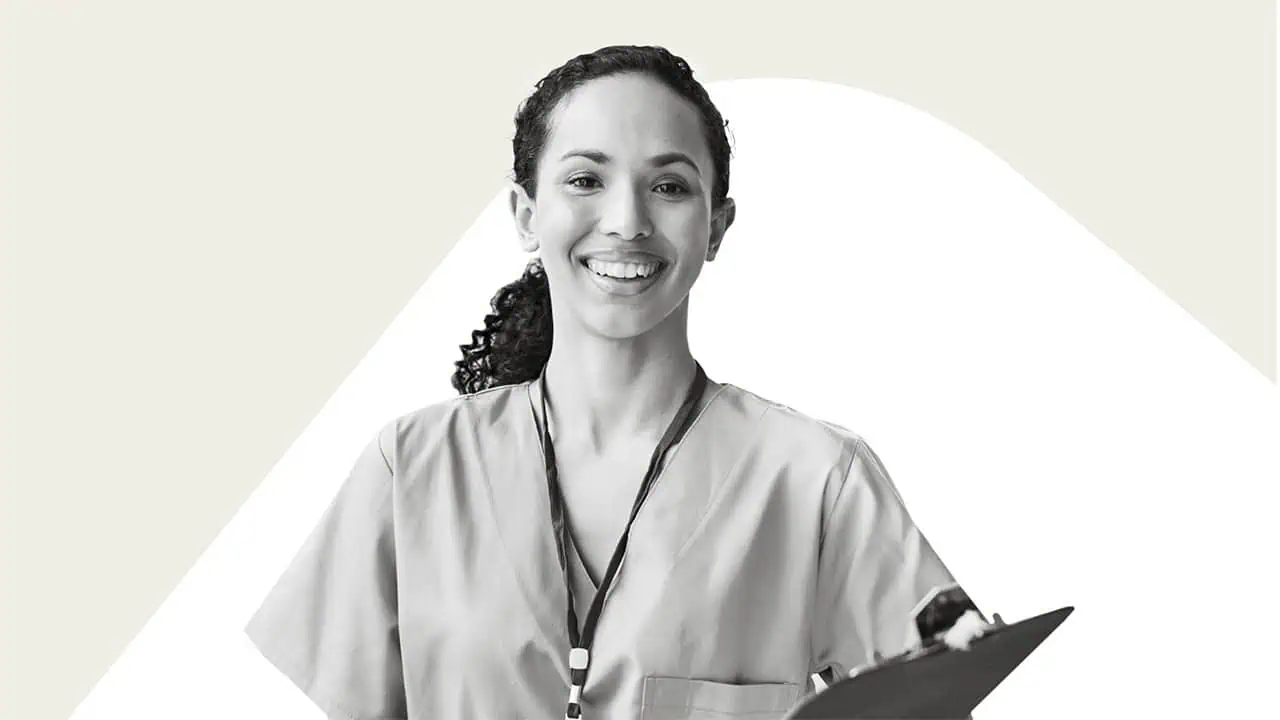
Overview
Occupational licensing affects more than 20% of workers in the United States. The extent of occupational licensing greatly differs across states. From both a research and public policy standpoint, it is important to have a comprehensive measure of occupational licensure across states and occupations.
Our goal is to add to this small but growing literature and provide an additional state-level index that will be useful to both researchers and the public policy community. We also wish to provide yearly improvements, and we are excited to share some changes in this 2024 edition of the State Occupational Licensing Index.
For the 2024 release, readers will note a few changes from the inaugural 2023 edition. First, the index contains fewer overall occupations, 284 as opposed to 331 in the 2023 release. This decrease is due to the removal of potentially duplicate licenses, combinations of occupation titles on our part, and the overall removal of some regulations that we believed should not be classified as licenses.
Second, we have added classifications for state adoption of universal licensing recognition. Universal licensing recognition provides a pathway for licensed or credentialed workers to transfer licenses for nearly all occupations from state to state without typical frictions (e.g., more training or long wait times).
Rankings
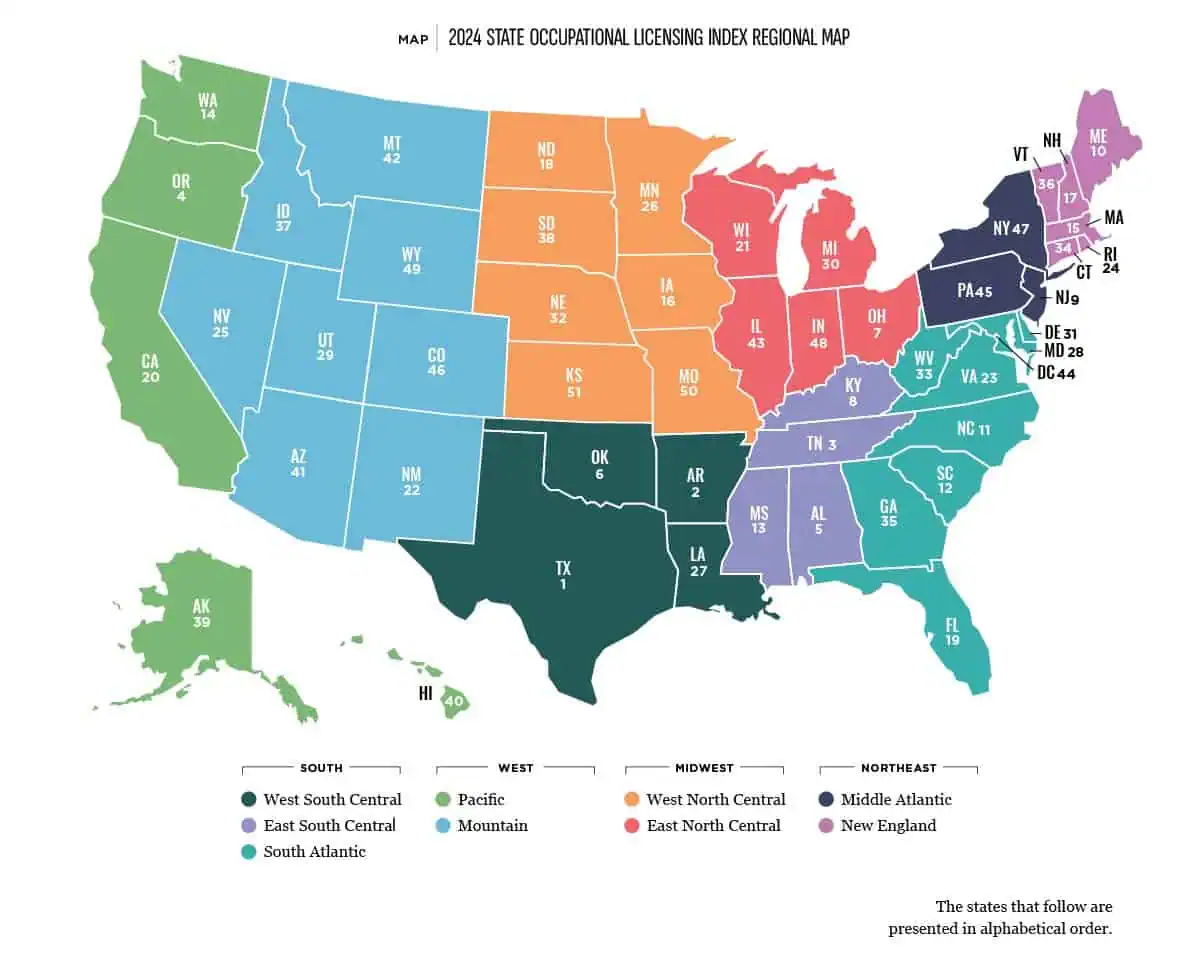
In 2024, the state with the highest occupational licensing burden is Texas (#1), followed by Arkansas (#2), Tennessee (#3), Oregon (#4), and Alabama (#5); the state with the lowest occupational licensing burden is Kansas (#51), preceded by Missouri (#50), Wyoming (#49), Indiana (#48), and New York (#47).
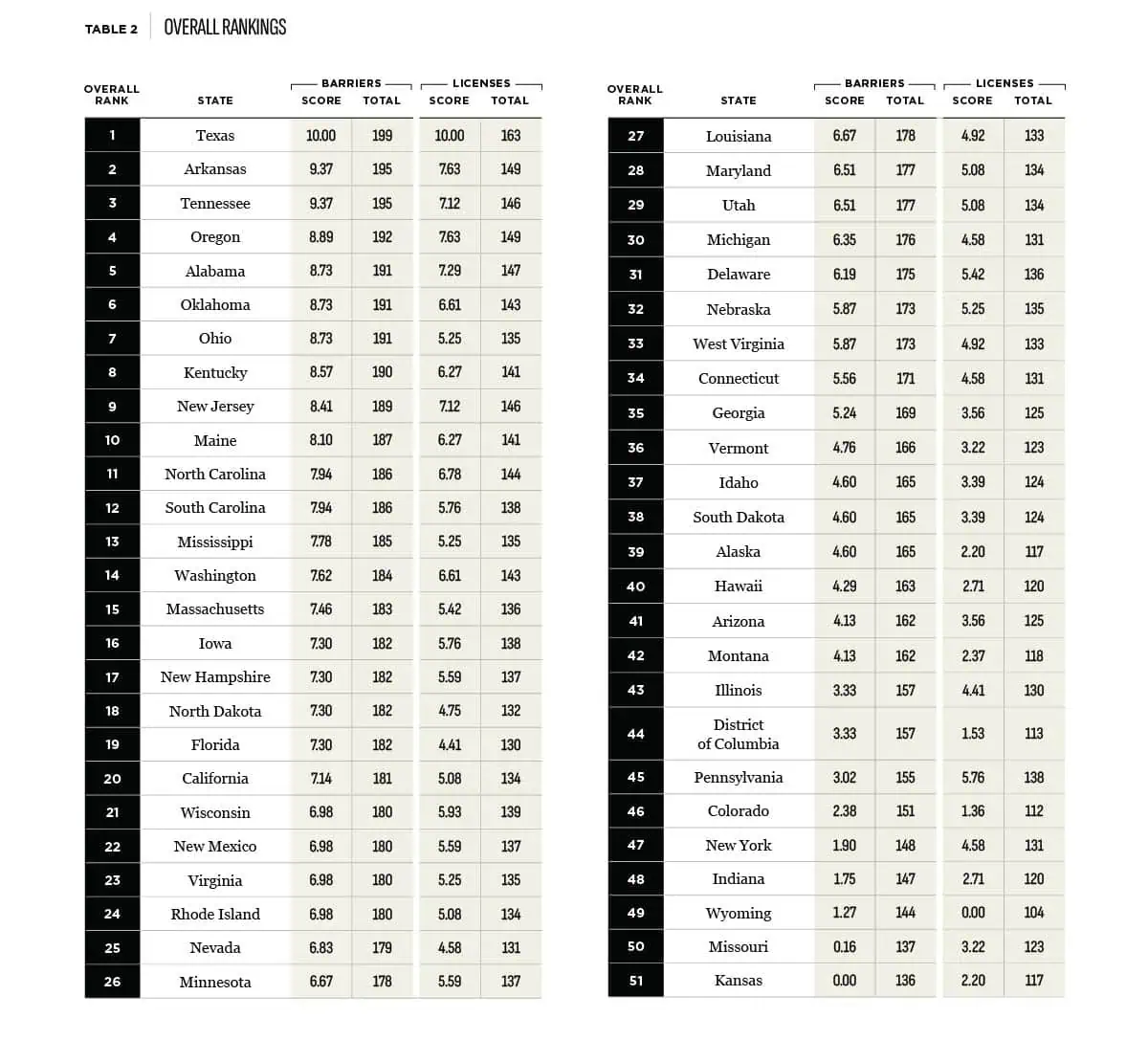
Universal Recognition
As of early 2024, 26 states have adopted some form of universal licensing recognition. It is important to note that the potential effectiveness of the reform varies depending upon two key provisions. First, some states have “substantially equivalent” clauses, thus limiting the number of workers that can utilize the reform. Second, some states have residency requirements that also can limit the ability of workers to utilize the reform.
We use a medal system to rank each state by the potential effectiveness of its reform. In 2024, we rated ten states as having gold-level reforms; these states do not have “substantially similar” or residency requirements. We gave silver medals to six states that do not have a “substantially similar” requirement but do have residency requirements, and we gave bronze medals to ten states for having “substantially similar” requirements. States with no designation have not yet enacted universal recognition.
State Profiles
Each state profile features the overall U.S. rank, a regional comparison, the total number of barriers and licenses and their respective scores, the status of universal recognition reforms, and the state’s most uniquely licensed occupation. This information provides useful insights for researchers and policymakers.
As a special insert for the 2024 edition, we have included a profile for Puerto Rico. Puerto Rico uniquely licenses 13 occupations, which is more than all U.S. states combined.
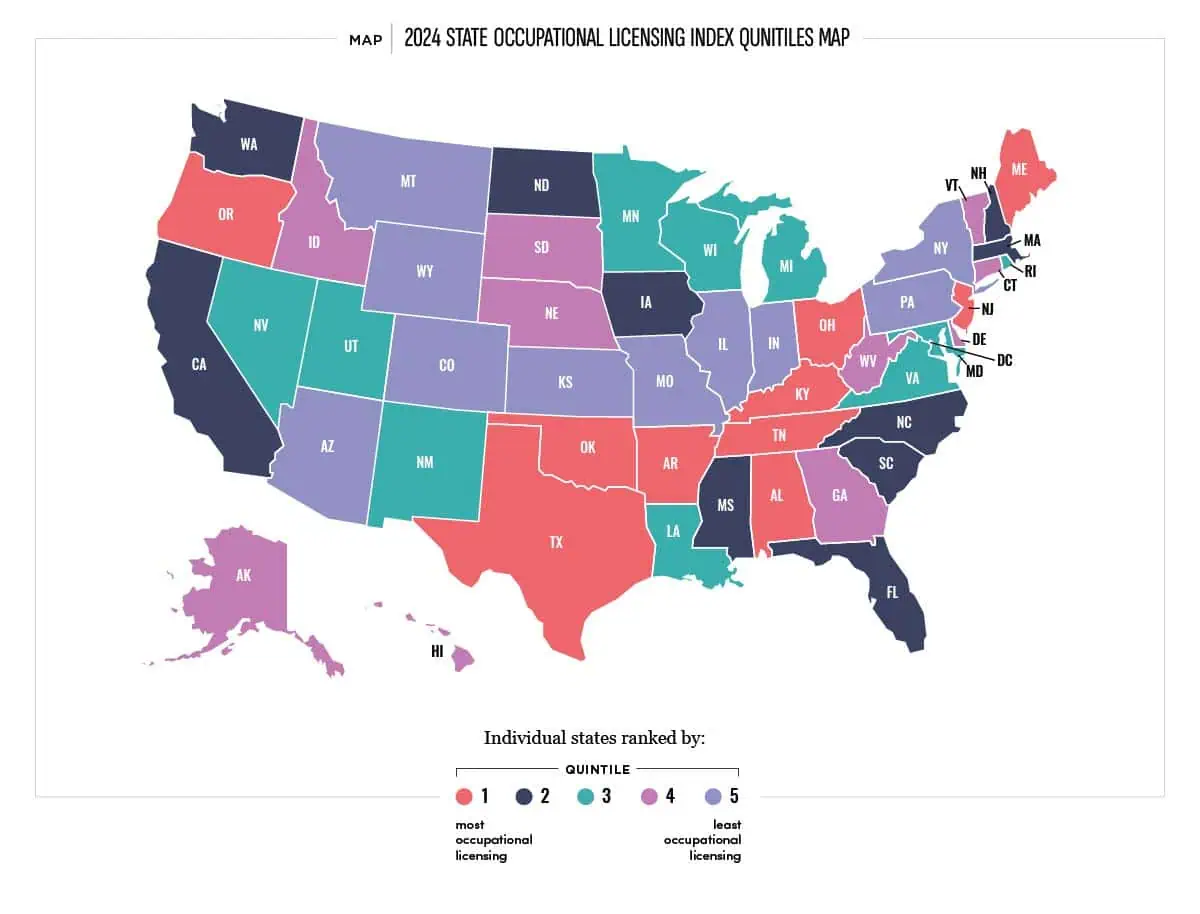
From the Authors:
“I am so excited to share our findings of the State Occupational Licensing Index 2024. Our goal is to improve the SOLI every year, and while that means you may see some changes this year, we believe them all for the best. For our public policy colleagues, we have highlighted an important facet of licensing in universal licensing recognition. For our more research-inclined colleagues, we are working to better explain and represent the differences in licensing across the United States. I hope the 2024 edition can be of use to everyone as we continue the discussion around the burdens of occupational licensing.”
– Noah Trudeau, PhD, lead author of the State Occupational Licensing Index
“With the State Occupational Licensing Index, we have combed through hundreds of professions and all 50 U.S. states to educate Americans about our heavy occupational licensing burden. After months of meticulous research, our team hopes to provide a valuable resource for the millions of workers directly impacted by occupational licensure and the many millions more who are indirectly affected by such requirements. Only through awareness and education can we hope to encourage more research on occupational licensing and pursue reforms that alleviate the burden on America’s workers, especially universal licensing recognition. In an uncertain labor market, we must recognize and remove the licensing-related barriers to work, financial security, and human flourishing.”
– Edward Timmons, PhD, co-author of the State Occupational Licensing Index
Data
The State Occupational Licensing Index datasets are available for download. Contact Noah Trudeau at ntrudeau@troy.edu with questions or further inquiries.
Download the State Occupational Licensing Index 2024 Master Data.
